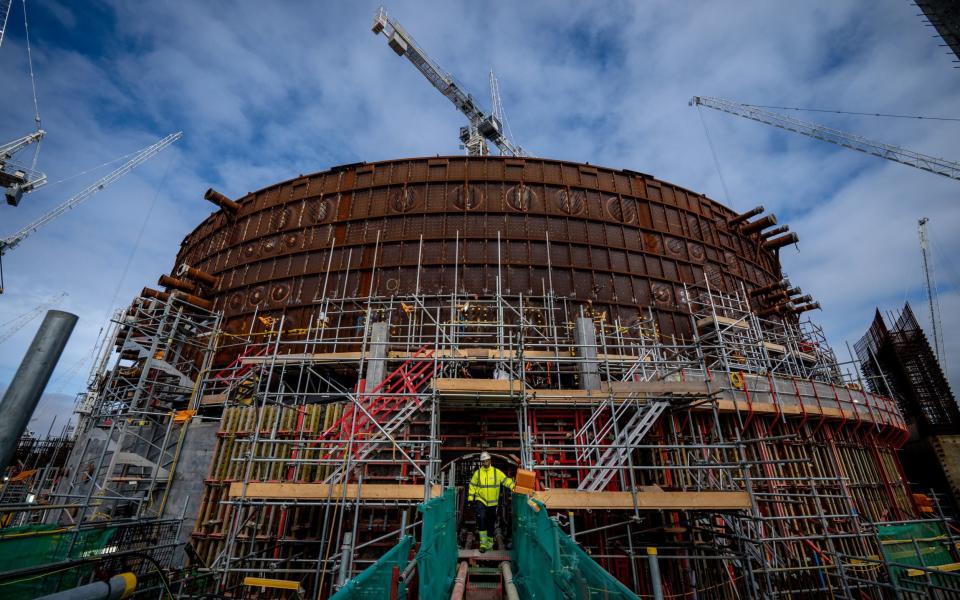Hinkley Point nuclear plant faces risk of 11-year delay

Britain's flagship Hinkley Point C nuclear power station is facing the risk of an 11-year delay, piling further pressure on efforts to keep the lights on.
According to a new contract between the Government and French company EDF, Hinkley will still be funded even if it does not start operating until 2036 - more than a decade after its initial deadline in 2025.
It raises the prospect of significant further hold-ups at Hinkley, which has already been delayed until mid-2027.
The 3.2 gigawatt plant, being constructed in Somerset by EDF and its minority Chinese state partner CGN, will be sufficient to supply 6m homes and is regarded as vital for the country's energy supplies because older reactors are being shut down. EDF insists the 2027 finish date has not changed.
The change to the subsidy contract terms comes as the Government is paying China a reported £100m to exit its involvement in a second planned new nuclear project, Sizewell C in Suffolk, which is also being developed with EDF.
China was welcomed into the UK’s nuclear industry in 2015 by former prime minister David Cameron under a so-called golden era of relations between China and the UK which Rishi Sunak said this week is now drawing to a close.
In his first major foreign policy speech as prime minister, Mr Sunak on Monday night rejected the “naive” idea that free trade would help foster democracy in China.
But he also warned against a return to Cold War-style hostilities, arguing “we cannot simply ignore China’s significance in world affairs”.
Hinkley Point C is one of three nuclear power plants CGN was slated to develop in the UK under the deal struck in 2015.
The Chinese business was to be a minority partner to EDF in Hinkley Point C and Sizewell C, and then leading a third plant, Bradwell B in Essex.
However, ministers are now keen to curb China’s involvement in critical national infrastructure.
The Government confirmed on Tuesday that CGN will exit Sizewell C, with the state paying an unconfirmed sum to cover its 20pc shareholding and a commercial return. The Times reported this to be £100m.
CGN’s involvement with Hinkley Point C is believed to be unaffected. However, as part of the negotiations, Hinkley Point C now has more leeway than previously to get up and running.
The project has a deal with the Government under which it gets a guaranteed £92.50 per megawatt hour for its electricity for the first 35 years of its life, backed by a levy on consumer bills.
Under the original deal, this state support can be scrapped if the plant is not generating electricity by November 1, 2033.
That date has now been moved to November 1, 2036.
The Government said this decision was driven by the impact of the coronavirus pandemic as well as the outcome of negotiations with CGN over Sizewell C.
There is no change to other targets in the subsidy contract, meaning that the length of time under which payments can be made may still be shortened if it does not start generating by May 2029.
The Low Carbon Contracts Company (LCCC), the government’s counterparty in the contract, argues this means that contractual pressure remains on the developer to commission the reactors as soon as possible.
The LCCC said: “Extending the long-stop date will not impact the delivery date of the project.
“The terms of the contract provide an incentive to complete commissioning as soon as possible.”
The contract is signed between the LCCC and NNB Generation Company (HPC), whose parent company is EDF.
Hinkley Point C opened discussions with the LCCC over the targets in 2021 as the pandemic took hold.
When the project was first agreed in 2016, it was due to start generating at the end of 2025.
In January 2021, that was pushed back to June 2026, and in May 2022 it was pushed back again to 2027, with EDF blaming the pandemic and supply chain issues. Costs are now expected to be as high as £26bn.
The plant is using a new type of generating technology, EPR, which is so far only in commercial operation in Taishan, China, where one reactor has been shut down due to problems.
EDF is separately battling a string of outages on its existing nuclear power fleet in France, worsening a Europe-wide energy crunch amid Russia's war on Ukraine.
Nuclear power currently supplies about 18pc of Britain's electricity. However, all but one of the UK's ageing fleet, also owned by EDF, is set to close within the decade, just as demand for electricity is set to grow with electric cars.
A spokesman for Hinkley Point C said: “Hinkley Point C’s schedule was recently reviewed in detail and remains unchanged.
“The power station’s clean home-grown electricity is needed to provide Britain with secure and affordable energy and to help the country kick its dependency on gas. The team at Hinkley Point C is working hard to make the plant operational as soon as possible.”

 Yahoo Finance
Yahoo Finance 